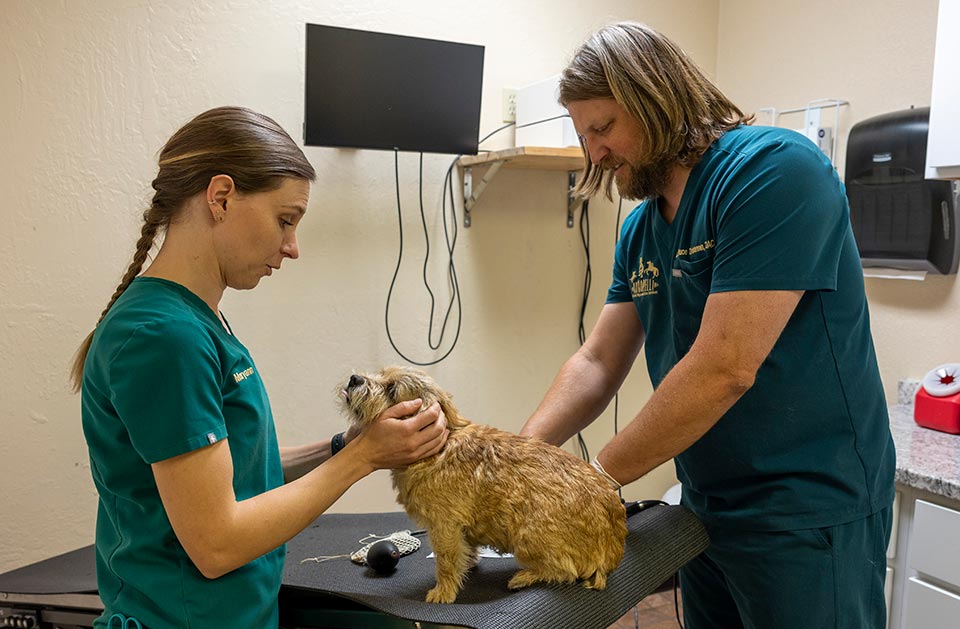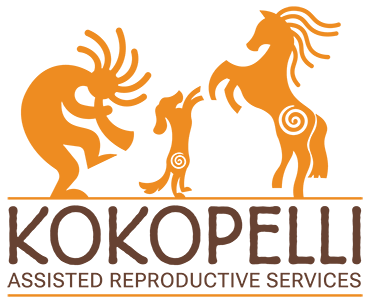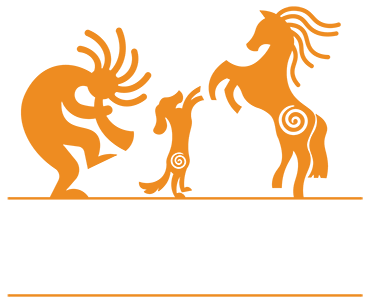Kokopelli offers the most comprehensive range of assisted reproduction services for canines in Northern California. With this breadth and depth of knowledge, we can expertly tailor our care to each dog’s unique needs.
Your Trusted Veterinarian for Exceptional Canine Breeding
Helping You Achieve a Healthy Breeding Program

Canine Services
TCI, a technique in which an endoscope is used to deliver sperm directly into the uterus, bypassing the cervix, is the optimal choice for canine artificial insemination in nearly every way compared to surgical insemination. It’s less invasive, less expensive, faster, usually requires no sedation, allows two inseminations in a cycle, and has higher pregnancy rates and litter sizes. The only time we recommend surgical insemination is when the bitch has endometrial (uterine) cysts, which we can reduce at the time of surgery.
Because TCI requires specialized equipment and training, we are one of the few practices in this region to offer it. Notably, a veterinarian – not a veterinary technician – performs every TCI procedure at Kokopelli. Further, our insemination timing is spot-on because we fully understand the canine reproductive cycle. What’s more, our TCIs are always accompanied by state-of-the-art semen analysis, so we know precisely how many viable sperm are being used, ensuring a better chance of success. In fact, our success rate for TCI with fresh or chilled semen is greater than 90%, and for frozen semen, better than 75%.
For additional information on this topic, please click here.
For webinar presentations on related topics, see below:
- Insemination With Fresh, Frozen, or Chilled/Shipped Semen – Dr. Bruce Christensen (2023)
Many practices rely on progesterone testing alone to determine breeding timing. We not only monitor progesterone levels (and offer same-day, affordable progesterone analysis), but we also use hands-on techniques such as vaginal cytology and vaginoscopy, enabling us to interpret results more precisely – and ensure successful breeding.
For webinar presentations on related topics, see below:
- Progesterone Testing in Breeding Management – Dr. Alan Conley (2023)
Brucellosis is a contagious bacterial infection that can cause reproductive issues in dogs (and it can be transmitted to humans). It is imperative to test both male and female dogs for brucellosis before breeding, and we require brucellosis testing every six months in actively breeding males and females in our care.
For webinar presentations on related topics, see below:
- Canine Brucellosis – Dr. Mary Sebzda (2022)
If a bitch is at high risk of problems during natural whelping, we recommend a scheduled elective c-section. High-risk canines include brachycephalic breeds, those with a personal or line history of whelping problems, or bitches with very large or very small litters for their size. Elective c-section is also a safe, reasonable option, even for a bitch that may otherwise whelp naturally. Importantly, with our experience and testing resources, we are able to accurately determine the best timing for these procedures.
As specialists, we pay close attention to details in c-sections that others may overlook – but which can have a significant impact on outcomes:
- Pre-procedure: Expectant mothers receive a preoperative ultrasound to evaluate fetal health and maturity, reverse-progesterone testing to determine when she is entering the first stage of labor, a full 20 minutes of oxygen prior to induction to ease her in and out of anesthesia, and an Adaptil collar that emits calming pheromones
- Pain management: Opioids are not used prior to puppy removal; instead, we use local analgesia initially, then administer opioids for pain management after puppies are removed.
- Puppy safety: Oxygen supplementation is available for any struggling neonate. Acupuncture also is used to help it start breathing. Once revived, each puppy is placed in a state-of-the-art canine incubator and closely monitored.
- Nursing/feeding: We supervise the first nursing to ensure each puppy receives colostrum. If the bitch doesn’t have milk, we can administer hyperimmunized plasma to allow passive transfer of immunity; we also can pharmacologically induce milk production. Our qualified staff can train owners how to safely tube-feed puppies, if necessary, which is safer than bottle feeding.
- Postop puppy care: Each puppy receives a detailed evaluation with APGAR scoring to guide owners about which puppies are thriving and which need extra attention.
For webinar presentations on related topics, see below:
- Elective vs emergency c-section: good idea? – Dr. Autumn Davidson (2022)
- Canine C- section: Why? When? How? – Dr. Bruce Christensen (2021)
Unlike most other practices that rely on subjective evaluations, we have invested in the most advanced semen analysis system currently available (SpermVision from MiniTube). It provides reliable, objective analysis of canine semen quality – contributing to our consistently high success rates.
We routinely perform x-rays a few days before the anticipated whelping date. This enables us to accurately count the fetuses and gauge the size of the fetal heads against the size of the maternal pelvis to assess the ease of whelping and the potential need for a c-section. Digital radiography is extremely safe for pregnant dogs – the amount of radiation exposure is equivalent to the amount you’d experience on a cross-country flight.
If a dog has missed breeding opportunities or conception has failed, inducing estrus – bringing a female dog into heat – may be performed to enable mating within a specific timeframe, to terminate a prolonged anestrus (a nonreproductive period), or to synchronize ovulation for embryo transfer. Various hormones or hormone-like substances may be used to induce estrus.
With our full array of ultrasound and digital radiography, we are the only practice in the Sacramento area offering gestational aging for clients who do not have ovulation dates for their animals. This enables us to determine the animal’s whelping window more precisely.
Kokopelli Assisted Reproductive Services proudly offers all health clearances, including OFA, PENNhip, German hip clearances, eye exams, cardiac exams, and all DNA testing.
OFA
The OFA is a database of x-rays and genetic tests that dog breeders use to help prevent the breeding of certain diseases, including hip and elbow dysplasia, hyperthyroidism, and heart and eye conditions. We provide the appropriate exams, x-rays, and blood draws for submission to the OFA for certification to help you produce the healthiest puppies possible.
PennHIP
PennHIP testing is a diagnostic tool commonly used by veterinarians to evaluate a dog’s susceptibility to hip dysplasia, an inherited condition that affects the hip joints in dogs. This test involves taking a series of X-rays of a dog’s hips while they are under anesthesia, which allows for the measurement of the degree of looseness, or laxity, in the hip joint. The results of the PennHIP test are valuable in predicting the possibility of a dog developing hip dysplasia later in life and aid breeders in making informed decisions about breeding. This test can be performed on dogs as young as 16 weeks old and is widely accepted as one of the most precise methods for detecting hip dysplasia in dogs.
For webinar presentations on related topics, see below:
- Canine Hip Dysplasia & OFA v PENN Hip – Dr. Peter Walsh (2021)
German Hip Clearances
German hip clearances refer to a set of standards used by the German Shepherd Dog Club of Germany (SV) to evaluate the hip health of German Shepherd Dogs (GSDs). These clearances involve a radiographic examination of the dog’s hips to assess the presence of hip dysplasia, a genetic condition that can cause pain, discomfort, and mobility issues in dogs. To receive German hip clearances, GSDs must have their hips x-rayed and evaluated by a certified veterinarian. The x-rays are then sent to a specialist panel of experts for grading based on established criteria. The grades range from A1 (excellent) to A2 (good), B (fair), C (marginal), D (moderate), and E (severe). GSDs that receive clearances with grades of A1 or A2 are considered to have “normal” hips and are recommended for breeding, while those with lower grades may be disqualified from breeding or require more careful selection of breeding partners. German hip clearances are an important tool for breeders seeking to produce healthy, genetically sound GSDs.
Eye Exams
Eye exams for breeders are veterinary tests that evaluate the eye health of breeding dogs. These exams can identify genetic eye disorders that can be passed down to offspring. Breeders can use the results of these exams to make informed breeding decisions that promote the overall health of their chosen breed.
For webinar presentations on related topics, see below:
- Genetic and congenital eye disorders – Dr. Sydney Edwards (2022)
Cardiac Exams
Cardiac exams for breeders are veterinary tests that evaluate the heart health of breeding dogs. These exams can help identify any heart conditions that may be passed down to offspring. By conducting these exams, breeders can make informed breeding decisions that promote the overall health of their chosen breed.
For webinar presentations on related topics, see below:
- Cardiac OFA Diseases and Evaluation – Dr. Michael Ahearn (2023)
DNA Testing
Full DNA testing involves the analysis of a dog’s entire genome to identify any genetic variations that may be associated with heritable health conditions or physical traits. This testing can help you identify dogs that are carriers of specific genetic diseases or traits, and make informed breeding decisions to reduce the likelihood of producing offspring with these conditions.
For webinar presentations on related topics, see below:
- Genetics of a Canine Breeding Program – Dr. Marco Bregliano (2022)
With our advanced diagnostic capabilities, we are able to identify such conditions as intersex, cystic ovaries, cystic endometrial hyperplasia, prolonged interestrous intervals, non-cycling, and reproductive tumors. Notably, Kokopelli is the only practice in Northern California offering transcervical endometrial biopsy for evaluating lowered fertility in females – a technique that Dr. Christensen helped pioneer. We work with a board-certified pathologist with special training in the canine reproductive system to interpret results.
For webinar presentations on related topics, see below:
- Infertility In The Female Dog – Dr. Cheryl Lopate (2023)
- Fertility supplements in your feeding program – Dr. Joe Wakshlag (2022)
Certain canine prostate conditions may be treated medically (non-surgically), preserving the dog’s fertility. No other practice in this region has our depth of experience in medically treating prostate disease in breeding males.
For webinar presentations on related topics, see below:
- Canine Prostate Disease – Dr. Bruce Christensen (2021)
This life-threatening uterine infection occurs due to hormonal changes in a female dog’s reproductive tract and typically affects older, intact bitches. While spaying may be indicated in severe cases, we offer comprehensive medical treatment in appropriately selected dogs – something few other practices have the expertise to do. And many of our patients have gone on to have successful litters.
For webinar presentations on related topics, see below:
- Non- surgical Treatment of Pyometra – Dr. Bruce Christensen (2021)
With our specialized experience, we understand that all male dogs’ semen doesn’t freeze the same. That’s why we’re the region’s only practice to use multiple types of semen extenders and perform an initial “test freeze” to determine which extender works best for each stud.
In most cases we will plan on collecting semen from your male twice on the same day. This protocol has been found to significantly increase the number of breeding doses from a freeze, in some cases doubling the amount of sperm.
We’re also the only practice in this area using a computer-assisted semen analysis system to ensure that sperm counts and motility analyses are accurate and consistent. We’ve discovered that many practices tend to “eyeball” semen samples; as a result, the quality of the semen doses we receive from other practices is often overestimated.
In addition, we’re able to get frozen semen to just about any place in the world through our alliance with Sires on Ice, an international semen shipping company.
Lowered fertility in a stud dog can occur for a variety of reasons including lack of libido, poor semen quality, failure to copulate or ejaculate, testicular degeneration, or prostatic diseases. With the breadth of our theriogenology capabilities, we are able to provide a comprehensive evaluation of subfertility in male dogs. This evaluation includes a detailed history, complete physical examination, advanced semen analysis, and selected diagnostic testing, which may include testicular biopsy – something no other practice in this region offers.
For webinar presentations on related topics, see below:
- Infertility In The Stud Dog – Dr. Stuart Mason (2023)
When accidental mating results in an unwanted pregnancy, we offer safe, medical (nonsurgical) termination without sterilization. To our knowledge, we are the only practice in this region to provide this type of treatment.
For webinar presentations on related topics, see below:
- Accidental Mating & Pregnancy Termination – Dr. Bruce Christensen (2023)
After reviewing the following summaries, please contact us to schedule a consult to discuss what would be best for your dog and your family.
Ovariohysterectomy (OVH)
Spaying is the common term used to describe the surgical procedure known as an ovariohysterectomy. In this procedure, the ovaries and uterus are removed completely in order to sterilize a female dog. This is the only procedure offered at most veterinary practices. In actual fact, removing both uterus and the ovaries is only necessary in very few cases, including those where the uterus is diseased or otherwise abnormal.
Ovary Sparing Spay (OSS)
An ovary sparing spay is where one or both ovaries are left in the abdomen, near the kidneys, but the uterus and cervix are removed. This procedure is appropriate in breeds at risk for certain cancers and who do not have unsupervised contact with intact males.
Ovariectomy (OVE)
This is the medical term for removal of the ovaries and leaving the uterus in place. Removing the ovaries prevents unwanted pregnancies, diseases of the uterus (including pyometra), and decreases the chance of mammary cancer in dogs. Removing only the ovaries results in a smaller surgical incision, less risk of post-operative bleeding, and easier recovery.
Laparoscopic OVE (LOVE Spay)
A LOVE spay is short for Laparoscopic OVE (ovariectomy). This is a minimally invasive spay that removes the ovaries from healthy dogs and has been shown to be a less painful alternative to traditional spays, which means a faster recovery and less trauma to their body. Activity restriction is only recommended for the first 2-3 days after a LOVE spay versus 7-14 days for a traditional spay.
Castration
Castration, also known as neutering, is the common term used to describe the surgical procedure during which both testicles are removed in order to sterilize (make infertile) a male dog, therefore stopping its ability to reproduce. Timing of when to perform the procedure, or whether to perform it at all, is not a simple, no-brainer decision.
Vasectomy
A vasectomy is a surgical procedure that is performed on male dogs to prevent them from being able to reproduce. The procedure involves the removal or modification of the vas deferens, which are the tubes that carry sperm from the testicles to the penis. Without the vas deferens, the dog will not be able to produce sperm, and he will be unable to father puppies. He will, however, retain all the health benefits of remaining intact.
After reviewing the following summaries, please contact us to schedule a consult to discuss what would be best for your dog and your family.
Suprelorin implant
Suprelorin is a subcutaneous implant that has been used in Europe and Australia for over 15 years and recently became legal in Canada. It releases a hormone (GnRH) over time that gives negative feedback to centers of the brain that normally stimulate the gonads. This shuts the gonads down and prevents cycling in females and prevents testosterone and sperm production in males. The implant effects last a minimum of 12 months, therefore a new implant must be placed annually, or the dog can be allowed to reverse and should return to fertility. Suprelorin is not approved for use in the United States. It can be obtained through our clinic with special FDA approval for specific cases.
For webinar presentations on related topics, see below:
- Alternatives to Spaying and Neutering in Dogs – Dr. Michelle Kutzler (2023)
Register for a Seminar
Want to further your education about canine reproduction to improve your breeding program? Explore our upcoming online reproduction health seminars today.
Contact Us Today
Whether you’re a professional breeder building a championship program, a novice aiming to breed healthy pets for family and friends, or a local veterinarian in search of a trusted advisor, we’re here for you with a comprehensive suite of assisted reproduction services for canines.

